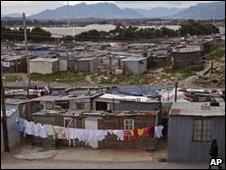Aids and HIV warning to South Africa World Cup fans
- Published

Many football fans may not see the more deprived side of South Africa
Sexual health charities are warning England football fans heading to South Africa - which has one of the worst Aids and HIV rates in the world - to take care.
With its new football stadiums, expensive hotels and sandy beaches, South Africa may look like any other tourist hotspot welcoming visitors this summer.
The country has poured 33bn rand (£2.9bn) into preparations for the 2010 World Cup, but behind the glistening new buildings lies the other side of South Africa - deprived townships, high levels of crime and health problems.
According to Avert, an Aids charity based in Horsham, West Sussex, an estimated 5.7 million people were living with HIV and Aids in South Africa in 2009 - a higher number than in any other country.
Charities are warning football fans travelling to South Africa to make sure they do not put their own sexual health at risk.
The London-based Terrence Higgins Trust surveyed 454 British 18 to 34 year olds and found one in ten admitted drinking so much alcohol while watching sporting events that they could not remember what they did afterwards.
The sexual health charity has published a World Cup guide to football fans on its website to help prevent the spread of infections both abroad and in the UK during the tournament.
Jason Warriner, clinical director at the trust, said: "When people go on holiday their behaviour pattern is very different to back home.
"People sometimes drink more than usual or use social drugs - opportunities may arise and they may not make the judgement call like they usually do.
"We are urging people to take condoms with them - have fun but look after yourself."
Earlier this year, the UK government donated £1m to South Africa to buy 42m condoms as the nation prepared for the World Cup and the influx of visitors.

New football stadiums have been built to host World Cup matches
The UK's All Party Parliamentary Group on Aids, HIVsport, which raises awareness of sexual health during sporting events, and the Foreign Office has launched advice website Keep a Clean Sheet.
It warns that large sporting events often lead to an increase in sexually transmitted infections.
Veronica Oakeshott, policy advisor to the group, said: "We are concerned that there will be fans going out there who are going to get drunk, be very over-excited and be approached by very lovely-looking women who do not look like prostitutes and may take risks that they will later regret."
Making money
With the world's spotlight on South Africa throughout the tournament and with some 450,000 tourists expected to pile into the country, there is money to be made.
All industries in the country will be looking forward to profiting from the event - and prostitutes will be no exception.
"A lot of these women will be infected (with HIV or Aids)," said Annabel Kanabus, director of Avert. "They will have other things as well.
"A lot of these people are not particularly choosing to live that sort of life - they are living it because they have to live it.
"It's an opportunity to make money."
There are fears that prostitution, which is illegal in South Africa, will thrive during the World Cup, with prostitutes flocking to the country from elsewhere in the world.
But Marlise Richter, a member of the women's sector of the South African National Aids Council, said she did not expect a significant increase in sex workers on the streets.
"There has been a lot of sensationalism about the increase in sex workers and trafficking," she said, adding that she was more concerned about how police will deal with prostitutes during the tournament.
She said the demand and supply of sex workers would be monitored and added that a lot of work had been done in the run-up to the World Cup to educate people in South Africa about safe sex.
- Published12 May 2010